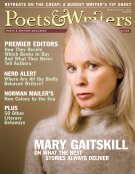For nearly as long as there has been a beast called American Poetry, there's been a battle for its soul. Readers of poetry have had ringside seats to such matchups as Walt Whitman's prolixity vs. John Greenleaf Whittier's careful rhyme, H. D.'s imagery vs. Edna St. Vincent Millay's romantic waxing, Lowell's cooked verse vs. O'Hara's raw lines, Marjorie Perloff's postmodern poetry vs. Helen Vendler's lyric tradition, and so on—poetry gladiators fighting to the death for their idea of the true American poem.
While this kind of rowdy rivalry might seem like a symptom of American poetry's suspended adolescence, it's a state of affairs that David St. John, coeditor with Cole Swensen of the new anthology American Hybrid, celebrates—up to a point. "Without getting too Darwinian about it," St. John says, "it's always instructive and entertaining to have competing values grind it out. But when those values stop engaging with one another, they're no longer relevant."
By presenting seventy-three poets, from Albert Goldbarth to Myung Mi Kim, all of whom the editors believe constitute what Charles Bernstein famously called "official verse culture" as well as its unofficial, avant-garde counterpart, St. John and Swensen hope that American Hybrid, published this month by Norton, can showcase the diversity of contemporary American poetry while also revealing the unusual affinities within it.
In her introduction, Swensen argues that instead of being populated by poets pledging allegiance to rigid aesthetic tribes, the contemporary landscape holds "writings and writers that have inherited and adapted traits developed by everyone from the Romantics through the Modernists to the various avant-gardes, the Confessionalists...and finally to Language poetry and the New Formalists."
It's a bold thesis, because the divide between "traditional" and "avant-garde" poetries has haunted American literature for at least a century. From the vorticists to the New York School poets to the School of Quietude, there has been an antagonistic (if symbiotic) relationship between the "experimental" and the "well made" that doesn't seem likely to fade soon.
But Swensen and St. John have selected a wide range of poets to back up their argument, confidently placing much-heralded, Pulitzer Prize-winning poets such as Jorie Graham, Robert Hass, and John Ashbery alongside small press cult heroes including Andrew Joron, Julianna Spahr, and Claudia Rankine. Each selection is prefaced by a short introduction that provides context for each poet and his or her writings, as well as a brief case for the poet's "hybridity."
"What these poets share is a fierce attention to the materiality of language, and a belief that the imagination can be given voice along a current of exploration," St. John says. "What they posit individually is the nuances of their sensibilities."
The anthology covers quite a bit of ground in its five hundred pages, and so it's no surprise that even before its publication it caused a slight tempest in the blogosphere. On the Poetry Foundation's blog, for example, Poetry magazine editor Don Share wrote, "I'm pretty sure everyone's going to resist the notion of a hybrid poem. Partly it will be because if you spend years grinding an ax, you're not just going to hang it up for good," a notion that proved true in the blog's comments section. But as St. John states in his introduction, "The great strength of American poetry resides, at its source, in its plurality of voices, its multitude of poetic styles, and its consistent resistance to the coercion of...prevailing literary trends."
Similar projects have arisen periodically—the literary journal Fence started out with a comparable mission a decade ago, and the late Reginald Shepherd's Postmodern Lyricisms: An Anthology of Contemporary Innovative Poetries (Counterpath Press) presented many of the same poets last year—but Norton, publisher of the authoritative anthologies of contemporary poetry, lends credence to the idea that the hybrid ethos has gained widespread acceptance.
"There are so many more poets who could have been in this anthology," St. John admits, "but what we wanted to show, for people who follow poetry closely and for people who might not, is that there's a new paradigm, and that this anthology is where to find out about it."
Travis Nichols is a poet and novelist living in Seattle. His first book, Iowa, will be published by Letter Machine Press in the fall.








